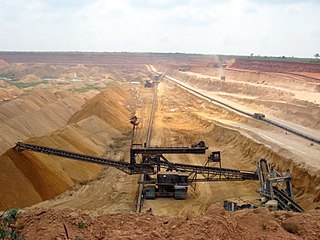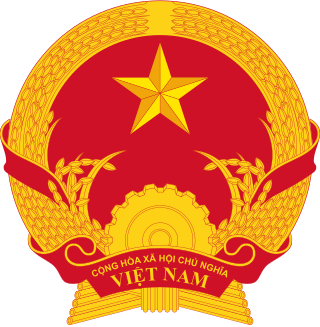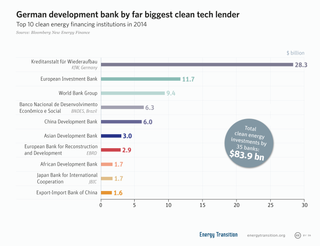Related Research Articles

The economy of Mali is based to a large extent upon agriculture, with a mostly rural population engaged in subsistence agriculture.

The economy of Senegal is driven by mining, construction, tourism, fishing and agriculture, which are the main sources of employment in rural areas, despite abundant natural resources in iron, zircon, gas, gold, phosphates, and numerous oil discoveries recently. Senegal's economy gains most of its foreign exchange from fish, phosphates, groundnuts, tourism, and services. As one of the dominant parts of the economy, the agricultural sector of Senegal is highly vulnerable to environmental conditions, such as variations in rainfall and climate change, and changes in world commodity prices.

The economy of Togo has struggled greatly. The International Monetary Fund (IMF) ranks it as the tenth poorest country in the world, with development undercut by political instability, lowered commodity prices, and external debts. While industry and services play a role, the economy is dependent on subsistence agriculture, with industrialization and regional banking suffering major setbacks.
Official development assistance (ODA) is a category used by the Development Assistance Committee (DAC) of the Organisation for Economic Co-operation and Development (OECD) to measure foreign aid. The DAC first adopted the concept in 1969. It is widely used as an indicator of international aid flow. It refers to material resources given by the governments of richer countries to promote the economic development of poorer countries and the welfare of their people. The donor government agency may disburse such resources to the government of the recipient country or through other organizations. Most ODA is in the form of grants, but some is measured as the concessional value in soft (low-interest) loans.

Development aid is a type of foreign/international/overseas aid given by governments and other agencies to support the economic, environmental, social, and political development of developing countries. Closely related concepts include: developmental aid, development assistance, official development assistance, development policy, development cooperation and technical assistance. It is distinguished from humanitarian aid by aiming at a sustained improvement in the conditions in a developing country, rather than short-term relief. Development aid is thus widely seen as a major way to meet Sustainable Development Goal 1 for the developing nations.

In international relations, aid is – from the perspective of governments – a voluntary transfer of resources from one country to another.

Development geography is a branch of geography which refers to the standard of living and its quality of life of its human inhabitants. In this context, development is a process of change that affects peoples' lives. It may involve an improvement in the quality of life as perceived by the people undergoing change. However, development is not always a positive process. Gunder Frank commented on the global economic forces that lead to the development of underdevelopment. This is covered in his dependency theory.
Japan emerged as one of the largest foreign aid donors in the world during the 1980s.

The Swiss Agency for Development and Cooperation (SDC) is an office-level agency in the federal administration of Switzerland, and a part of the Federal Department of Foreign Affairs. Together with other federal offices, SDC is responsible for overall coordination of Swiss international development activities and cooperation with Eastern Europe, as well as humanitarian aid.
Historically, Venezuela has been categorized as one of the most successful countries in Latin America specifically during its democratic period between 1958 and 1999. As the wealthiest country in this region and an OPEC member, Venezuela has been more frequently a donor than a recipient of foreign assistance. Its economic dependency on oil resources was the main reason why this reputation reached the international public sphere. The effectiveness of oil revenues has had a huge impact on public expenditure and, as a result, a double-sword mechanism for the government to choose between an effective role for this institution towards a welfare state and clientelism.

The World Bank’s assistance program of foreign aid to Vietnam has three objectives: to support Vietnam's transition to a market economy, to enhance equitable and sustainable development, and to promote good governance. From 1993 through 2004, Vietnam received pledges of US$29 billion of Official Development Assistance (ODA), of which about US$14 billion, or 49 percent, has been disbursed. In 2004 international donors pledged ODA of US$2.25 billion, of which US$1.65 billion was disbursed. Three donors accounted for 80 percent of disbursements in 2004: Japan, the World Bank, and the Asian Development Bank. During the period 2006–10, Vietnam hopes to receive US$14 billion–US$15 billion of ODA.
Nepal relies heavily on foreign aid, and donors coordinate development aid policy through the Nepal Development Forum, whose members include donor countries, international financial institutions, and inter-governmental organizations. Japan is Nepal's largest bilateral aid donor, and the World Bank and Asian Development Bank are the largest multilateral donors. Donors have been reported as losing confidence in Nepal as a result of political interference and corruption in poverty relief efforts as well as the country's apparently poor capacity to utilize aid. According to World Bank figures, official development assistance increased from US$8.2 million in 1960 to US$369 million in 2003 and then fell to US$177 million in 2004. According to Nepal's Ministry of Finance, total foreign aid committed in fiscal year (FY) 2003 was US$555 million, with 63.3 percent in grants and 36.7 percent in loans. In FY2004, total foreign aid committed was US$320 million, of which 37.7 percent was grants and 62.3 percent, loans. In June 2004, active World Bank credits totaled US$302 million, with the greatest portions allocated to the financial sector and to energy and mining. By the end of 2012, the outstanding World Bank IDA loan totaled $ 1.48 billion.

Gerhard "Gerd" Müller is a German politician of the Christian Social Union in Bavaria who has served as Director General of the United Nations Industrial Development Organization since 2021.

Development financial institution (DFI), also known as a Development bank, is a financial institution that provides risk capital for economic development projects on a non-commercial basis.
Devex is a social enterprise and media platform for the global development community. It aims to connect with and inform development, health, humanitarian, and sustainability professionals through news, business intelligence, funding and career opportunities related to international development. As an independent news organization, Devex employs more than 100 staff members in different locations, including Washington, D.C., where the organization is headquartered. It also maintains offices in Barcelona and Manila.
The Republic of Kiribati's per capita Gross National Product of US$1,420 (2010) makes it the poorest country in Oceania. Phosphates had been profitably exported from Banaba Island since the turn of the 20th century, but the deposits were exhausted in 1979. The economy now depends on foreign assistance and revenue from fishing licenses to finance its imports and development budget.

Canada–Mali relations are the bilateral relations between the countries of Canada and Mali. Mali has an embassy in Ottawa whilst Canada has an embassy in Bamako.

Climate finance is an umbrella term for funding investments in the area of climate change mitigation and adaptation. In a wider sense, the term refers to all financial flows relating to climate change mitigation and adaptation. In a narrower sense it only refers to transfers of public money from developed countries to developing countries. This would be in light of their obligations under the UN Climate Convention to provide new and additional financial resources.
The external debt of India is the debt the country owes to foreign creditors. The debtors can be the Union government, state governments, corporations or citizens of India. The debt includes money owed to private commercial banks, foreign governments, or international financial institutions such as the International Monetary Fund (IMF) and World Bank.
Indian foreign aid is the aid given by the Indian government to other governments. India's major quantum of foreign aid is given to neighbouring countries. According to India's budget in 2021–22, its direct overseas aid stood at ₹18,154 crore (US$2.3 billion). That apart, India also extended a direct line of credit worth $30.66 billion to several foreign countries for developmental projects. The way of providing a much larger share of aid in the form of concessional loans is quite similar to that of China. India has set up 'Indian Agency for Partnership in Development' as a part of Ministry of External Affairs (India) to channelize aid to recipient nations.
References
- 1 2 3 4 5 "Country Profile: Mali" (PDF). Federal Research Division, Library of Congress. January 2005. Retrieved November 5, 2020.
 This article incorporates text from this source, which is in the public domain.
This article incorporates text from this source, which is in the public domain.{{cite web}}: CS1 maint: postscript (link) - 1 2 "India extends $100 million line of credit to Mali". The Hindu. PTI. 2012-01-11. ISSN 0971-751X . Retrieved 2021-08-31.